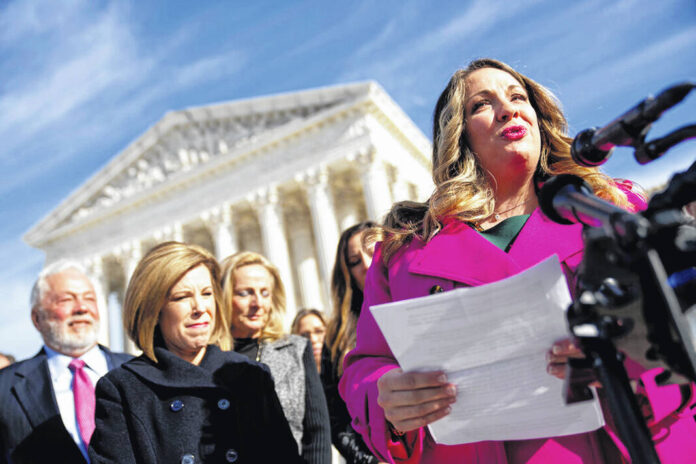WASHINGTON — The Supreme Court’s conservative majority sounded sympathetic Monday to a Christian graphic artist who objects to designing wedding websites for gay couples, a dispute that’s the latest clash of religion and gay rights to land at the highest court.
The designer and her supporters say that ruling against her would force artists — from painters and photographers to writers and musicians — to do work that is against their beliefs. Her opponents, meanwhile, say that if she wins, a range of businesses will be able to discriminate, refusing to serve Black customers, Jewish or Muslim people, interracial or interfaith couples or immigrants, among others.
Over more than two hours of spirited arguments, the justices repeatedly tested out what ruling for the designer could mean, using detailed and sometimes colorful hypothetical scenarios. Those included a Black Santa asked to take a picture with a child dressed in a Ku Klux Klan outfit, a photographer asked to take pictures for the Jewish dating website JDate and also the marital infidelity website Ashley Madison, and a food business called “Grandma Helen’s Protestant Provisions.”
Justice Neil Gorsuch, one of three high court appointees of former President Donald Trump, described Lorie Smith, the website designer in the case, as “an individual who says she will sell and does sell to everyone, all manner of websites, (but) that she won’t sell a website that requires her to express a view about marriage that she finds offensive.”
Where to draw the line for what a business might do without violating state anti-discrimination laws was a big question in Monday’s arguments at the high court.
Justice Sonia Sotomayor repeatedly pressed Kristen Waggoner, the lawyer for Smith, over other categories. “How about people who don’t believe in interracial marriage? Or about people who don’t believe that disabled people should get married? Where’s the line?” Sotomayor asked.
But Justice Samuel Alito, who seemed to favor Smith, asked whether it’s “fair to equate opposition to same-sex marriage to opposition to interracial marriage.”
The case comes at a time when the court is dominated 6-3 by conservatives and follows a series of cases in which the justices have sided with religious plaintiffs. Across the street from the court, lawmakers at the Capitol are finalizing what would be a landmark bill protecting same-sex marriage.







